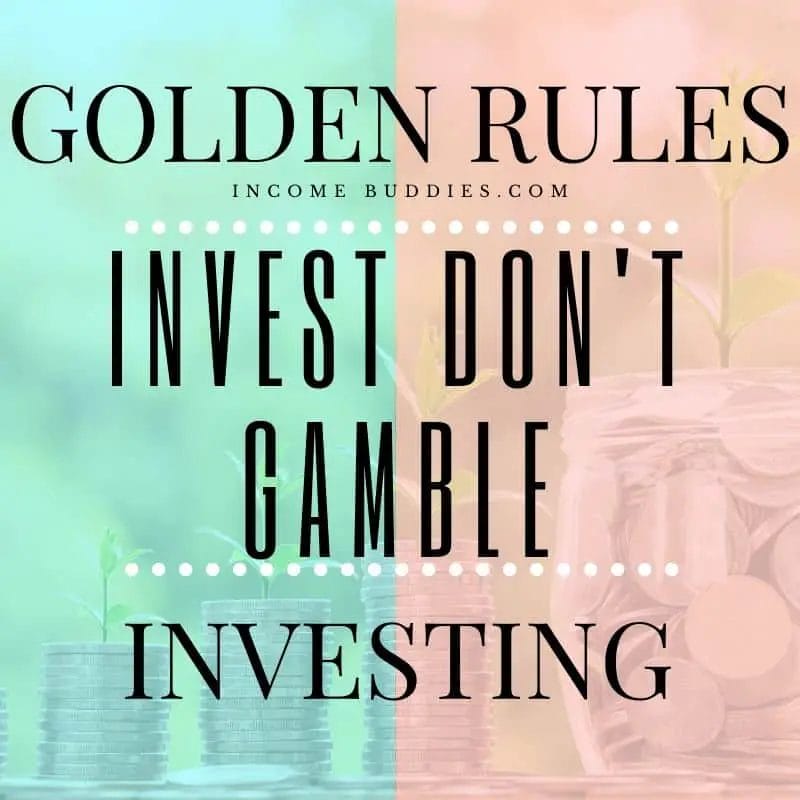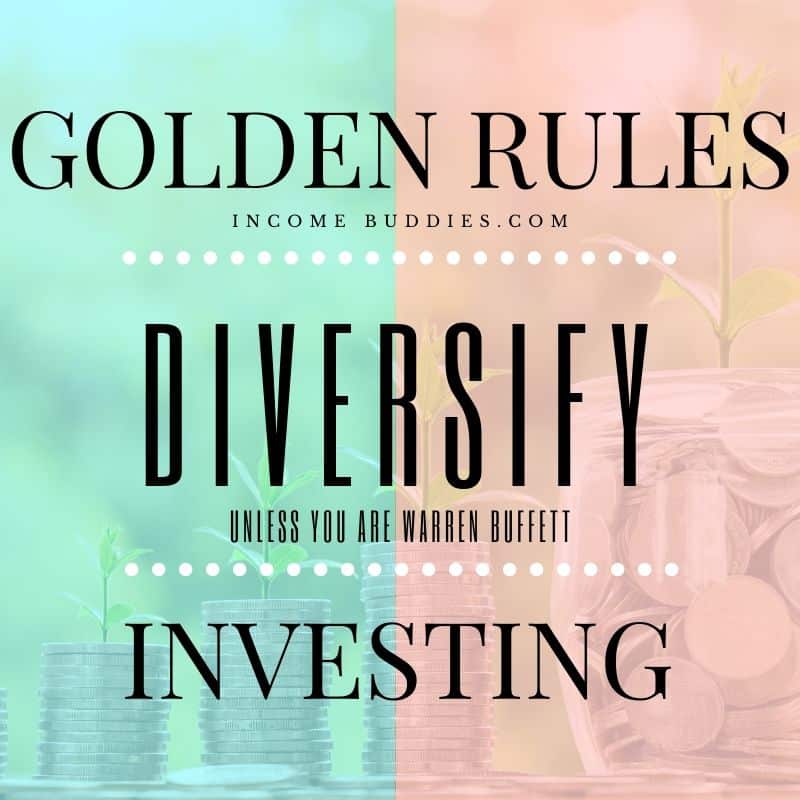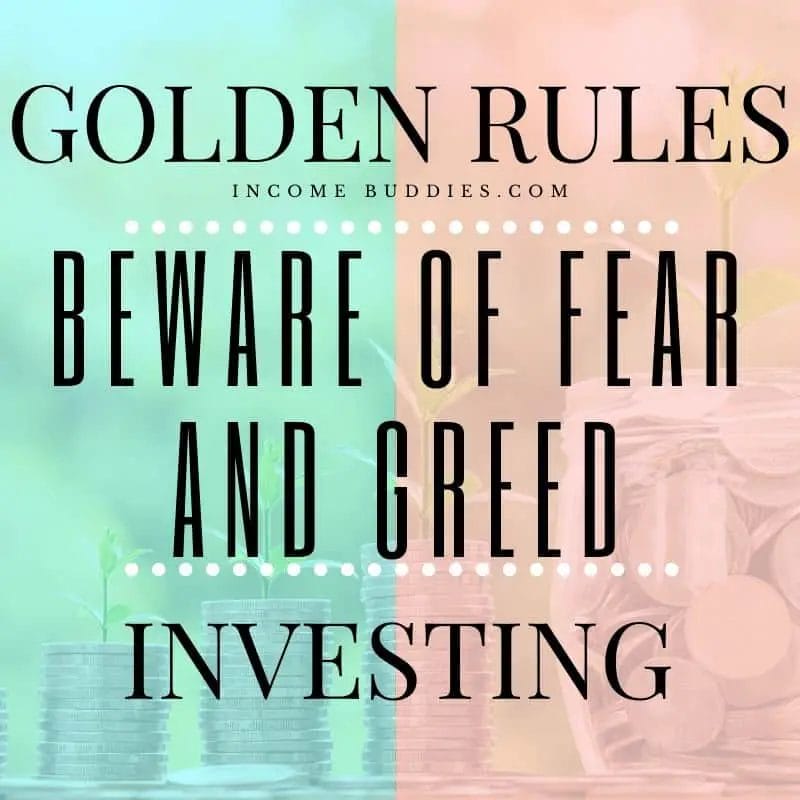7 Golden Rules of Investing in Stocks as Investors
Do you know what are the golden rules of investing, rules to live by as you start investing towards your investment goals?
Small investors have a lot of advantages when investing in the stock market, you can decided on your own investment strategy, investment plan and have full control of your money in the stock market.
We all know trying to time the market is impossible, however successful investing can be made possible if you follow these golden rules to profitable investing.
KEY TAKEAWAYS
- Investing involves building up a strong investment portfolio that will meet your financial goals, making investments decisions that help your money to grow.
- Investment rules includes; do not follow the crowd, invest don’t gamble, know the value, diversify, don’t listen to forecasts, invest in what you know, your circle of competence and beware of fear and greed.
- Warren Buffett most important rule is, “Do not loss money”.
7 Golden Rules Of Investing For Investors
Every road to success has certain rules to follow, same goes for investing. Amount dozens of rules for investing, there are a few that stand out the most and should be followed by every investor who wants to profit from the stock market.
Here are the rule of investing that can be used across investment markets and products many investors follows.
1. Don’t Follow The Crowd
Warren Buffett famously said: “Be fearful when others are greedy, be greedy when others are fearful.”
Amount all the investing advice given by Warren Buffett, this is probably the most famous.
To put it simply: “don’t follow the crowd”.
Although this sounds easy, it is actually easier said than done. Simply because following the crowd is basically our natural instinct.

In the wild, animals tend to stick in a herd because of safety in numbers, when the predators are here, their chances of survival will be much higher.
But in investing, sticking to the herd has the opposite effect. Instead of safety in numbers, if you follow the herd for investing, you will most likely lose your investment or at most be mediocre.
- In the wild: Safety in numbers.
- In investing: Never follow the herd. If you follow the average, you will be part of the average.
In most cases when we are talking about investing, most average investors:
- Sell when feeling fearful.
- Buy when feeling greedy.
They tend to buy when the stock price is sky-high and sell when the stock price is very low.
- Good investing is to buy low sell high, following the crowd will lead you to do the opposite.
By following the crowd, these investors will most likely make the wrong decision at the worst possible time.
Let’s check this short video by National Geographic on an experiment on herd mentality.
2. Invest Don’t Gamble
People argues that investing is basically a form of gambling. This couldn’t be more far from the truth.
- In a short term, any stocks will have a 50% probability that the price going up and a 50% probability that the price going down.
- In a long term, the price of the stock always reflects the value of the company.

Short-Term ‘Investors’
Many ‘day traders’ who invest for the short term call themselves investors, which I don’t really agree with.
Day traders trade on the fluctuation of the market in the short term. They trade on the price of the stock that is driven by human greed and fear. The price they trade will give them a 50% probability of stock prices going up and down.
The value of the company itself is not taken into consideration, but instead, the unpredictability of human behavior is used in each trade instead.
Although they do use technical analysis to help them in each trade, I don’t really agree that they are called investors.
Long Term Investors
On the other hand, successful investors such as Warren Buffett invest for the long term. They don’t invest in the unpredictability of human behavior but in the value of the company itself.
Warren Buffett have been famously quoted ‘Our favorite holding period is forever.’
What? Forever?
Yes, that is how he made his billions. Simply because when you have found a great company, you want the company to help you grow your investment.
In a short term, the price will most often not reflect the value of the company. But over the long term, the price of the stock will reflect the intrinsic value of the company.
Investing is about buying a good value stock for a low price and selling it when the price is high.
3. Know the Value, Know The Price
Always understand what you’re investing can help you determine the value of the stock better.
- Is the stock currently overvalued?
- Is the stock currently undervalued?
Buying stocks is like going for shopping for great deals.
Whatever stock we are thinking of purchasing, we will always want to know that we are not overpaying it, but buying it when it is on sale.
Great stocks go on sale once in a while, and it happens only during black swan events, recession or during a market crash.
But how do we even know if the stock is currently on sale?

“Price is what we pay, and value is what we get.”
Warren Buffett
Every company (represented by its stock) has its own intrinsic value.
Definition: Intrinsic value is the value of the company if you are buying the whole company according to the current equity, growth potential and future prospect of the company.
Price is what most people think the company cost right now, the fluctuation of price is independent of the company’s intrinsic value, because price is controlled solely by market conscious of the stock.
Price is highly influenced by fear and greed of the investors and it is not a reflection of the value of the stock.
- When the price of the stock is more than the value of the company, it is called overvalued.
- When the price of the stock is less than the value of the company, it is called undervalued.
Stocks become overvalued and undervalued on 2 different occasions:
- Stocks become overvalued when the market is too optimistic, generally during a bull run.
- Stocks become undervalued when the market is pessimistic, generally during a bear market or market crash.
For investors who want to make a profit from investing, buy the stocks when the stock is undervalued and sell them when it becomes too overvalued. Thus, knowing the value of the stock is just as important as knowing the price of the stock.
4. Diversify
Diversification is especially important for investors who do not have time to manage their portfolios or those who only have a piece of basic knowledge of investing.
This rule is important to most investors. Even though diversification won’t get you a stellar return on your investment, you won’t do very badly either.
Good rule of thumb is to diversity and spreading your money across range of investment options. This will help to
- Spread your investments across asset classes and index funds.
- Control the level of risk of losing your money across a range of different investment vehicles.
- Help you stay relatively safe during market volatility through smart asset allocation.
Diversification is a great protection against ignorance. So, unless you are Warren Buffett, or Charlie Munger, who is amazing at finding great stocks by studying the balance sheet and income statement.
The best advice is for you (I am included) to diversify your portfolio.
There is an old saying of “Don’t put all your eggs in one basket”.

Holding a portfolio of just one or two stocks can be pretty dangerous when things go south. Diversification is to hold a portfolio of investments with a low correlation to each other.
Let’s take a look at the wrong and right way to diversity.
Wrong Way of Diversification
Worst way to diversity is to buy a bucket of stocks from the same sector or industry which are highly related to each other.
When one of the stocks falls, all the other stocks will fall as well. Because all are from the same sector or industry.
Not only do you have to manage a whole bunch of stocks, both good and bad, which a lot of mistakes can happen, but this offers no protection to market fluctuation.
Right Way of Diversification
The right way of diversification is to buy stocks that do not correlate to each other. And the best way of buying such stocks is by buying the respective Exchange Traded Funds (ETFs).
ETFs are a low-fee basket of stocks from that sector or industry where it is professionally managed to reflect the sector’s or industry’s general performance.
An example of a diversified portfolio is as follows:
- W% Gold ETFs
- X% Bonds ETFs
- Y% REITs ETFs
- Z% Blue Chip Stocks ETFs
Gold and bonds are usually inversely correlated to stocks and REITs.
The performance of your portfolio will be less volatile and the value of your investment will be less impacted when market crashes or when there is a black swan event.
With a long-term investment horizon, you will less likely to loss money or loss sleep due to your investment.
5. Don’t Listen to Expert Forecasts
Most experts will hate me for this, but don’t listen to the expert’s forecast, or at least listen with a pinch of salt.
Don’t get me wrong, I am not saying all experts are bad, they definitely know their stuff about investing, they are experts.
Tip: When the expert announced to the world and tells you what is hot right now and what to buy or what to sell. The expert have already made all the gains it want to make, and getting in when the “Good News” is announced, it is probably already too late in the game.
When investing experts make recommendations on certain stocks, the stock might already be overvalued by the time you learn of the news.
Many investors might already be taking out their profit. New investors who just learned of the news may now be buying the same stocks at an all-time high which is not something you should do.
Tip: Be extra mindful of expert’s forecast on a certain stocks and do your own research before you make the next buy or sell decision.

6. Invest What You Know
Everyone has a different background and a different understanding of different industries. Stick to investing in what you understand and stay away from those which you don’t.
“Always invest in your circle of competence.”
Warren Buffett
You don’t get successful in investing by knowing a bit of every industry, you profit from investing by being knowledgeable about a few selected industries which interest you.
Warren Buffett buys Coca-Cola in 1988, not long after the famous Black Monday. With a low price and great value, Warren Buffett purchased 23.35 million shares of Coke. Since 1988, Coke stocks have climbed 1,750% and made Warren a very wealthy man. With a current owner of over 400 million shares of Coke, Warren is getting half a Billion dividend yearly.
How did Warren Buffett make a such fantastic investment?
Simply because he and many other successful investors, invest in their circle of competence, or in other words, invest in what they know.
You can too make such a great investment, but first, you have to find the few industries which you know best.
Finding Your Circle of Competence
Here are the steps for finding you own circle of competence:
- Draw 2 circles slightly overlapping each other and each gives a title
- My Passion
- Where I Earn/ Spend My Money
- Fill each circle, if that item falls into both categories write it in the portion where the circle overlaps.
- Now see what are the items that are found at the overlapped circle
- Select 3 items and research stocks that are related to these 3 items.
- These stocks that are related to these 3 items will be your first circle of competence
Getting your circle of competence is just your first step, then next step is to be very knowledgeable about it and then allow you to make the right investment decision in the future.

7. Beware Of Fear And Greed
Perhaps the most important rule of investing is to avoid the traps caused by your own fear and greed.
Basic human emotion is the greatest enemy of profitable investing.
You can be a short-term day trader or a Warren Buffett-style long-term investor, a disciplined approach is a key to profit from investing.
All successful investors plan each investing decision, they ask a few questions before they buy, or sell a stock.
Before you buy, ask yourself the reason why you want to buy a certain stock and not the other:
- Is it because that others are buying, thus you buy?
- Is it because someone said it is good, thus you buy?
- Is this buying decision emotional, or because it is the right decision?
Just check if you are falling into the trap of Greed before making your investing decision.
Before you sell, ask yourself the reason why you want to sell it now and not later, or earlier:
- Is it because that others are selling, thus you sell?
- Is it because someone said it is the right time to sell, thus you sell?
- Is this selling decision emotional, or because it is the right decision?
Just check if you are falling into the trap of Fear before making your investing decision.
The key is…
Don’t let your emotion take control of your decision. Making your investment decision based on facts and figures will allow you to be much more successful in investing.

How Golden Rules Of Investing Can Help You When Investing in the Stock Market
Every successful investors each has to follow a set of rules as a guideline when making each investment decision.
Here we’ve look into some of the golden rules of investing which you should always follow when you begin investing in the investment world.
Regardless if you are a growth investor, a dividend investor, or a value investor, these rule of investing still applies.
Warren Buffett’s two rules to investing are:
- First Rule: Never lose money
- Second Rule: Never forget rule one
Rules of profitable investing allow small investors like you to perform well in investing. And understanding these rules lets you have an unfair advantage over all other investors helping you reach your financial goals faster and get higher returns on your investment.
- How to Use Webull Singapore to Trade, Buy and Sell Stocks? (Beginner’s Guide)
- How to Use Moomoo to Trade, Buy and Sell Stocks? (Beginner’s Guide)
- Best Trading Platform For Beginners in Singapore (Students, NSF, Fresh Graduates)
- Day Trading For Beginners: Guide On How To Become a Day Trader
- Average Brokerage Fee in Singapore: 20+ Broker Fees Compared
Join 900+ BUDDIES who are growing their wealth with our weekly Income Newsletter
Antony C. is a dividend investor with over 15+ years of investing experience. He’s also the book author of “Start Small, Dream Big“, certified PMP® holder and founder of IncomeBuddies.com (IB). At IB, he share his personal journey and expertise on growing passive income through dividend investing and building online business. Antony has been featured in global news outlet including Yahoo Finance, Nasdaq and Non Fiction Author Association (NFAA).

